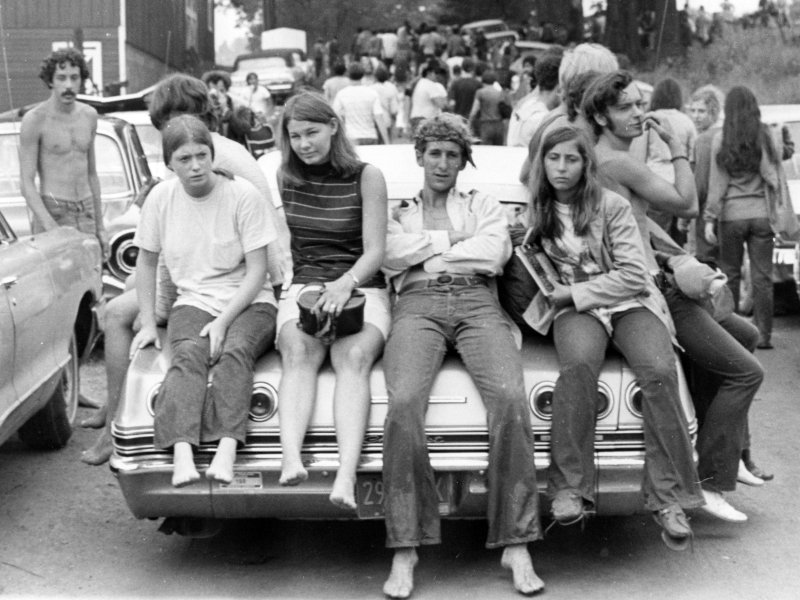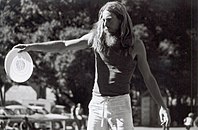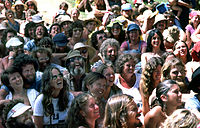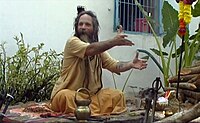
Hippie
A hippie, also spelled hippy,[1] especially in British English,[2] is someone associated with the counterculture of the 1960s, originally a youth movement that began in the United States during or around 1964 and spread to different countries around the world.[3] The word hippie came from hipster and was used to describe beatniks[4] who moved into New York City's Greenwich Village, San Francisco's Haight-Ashbury district, and Chicago's Old Town community. The term hippie was used in print by San Francisco writer Michael Fallon, helping popularize use of the term in the media, although the tag was seen elsewhere earlier.[5][6]
"Hippies" redirects here. For the British comedy series, see Hippies (TV series). For the garage rock album, see Hippies (album). For other uses, see Hippie (disambiguation).
The origins of the terms hip and hep are uncertain. By the 1940s, both had become part of African American jive slang and meant "sophisticated; currently fashionable; fully up-to-date".[7][8][9] The Beats adopted the term hip, and early hippies adopted the language and countercultural values of the Beat Generation. Hippies created their own communities, listened to psychedelic music, embraced the sexual revolution, and many used drugs such as marijuana and LSD to explore altered states of consciousness.[10][11]
In 1967, the Human Be-In in Golden Gate Park, San Francisco, and the Monterey International Pop Festival[12] popularized hippie culture, leading to the Summer of Love on the West Coast of the United States, and the 1969 Woodstock Festival on the East Coast. Hippies in Mexico, known as jipitecas, formed La Onda and gathered at Avándaro, while in New Zealand, nomadic housetruckers practiced alternative lifestyles and promoted sustainable energy at Nambassa. In the United Kingdom in 1970, many gathered at the gigantic third Isle of Wight Festival with a crowd of around 400,000 people.[13] In later years, mobile "peace convoys" of New Age travellers made summer pilgrimages to free music festivals at Stonehenge and elsewhere. In Australia, hippies gathered at Nimbin for the 1973 Aquarius Festival and the annual Cannabis Law Reform Rally or MardiGrass. "Piedra Roja Festival", a major hippie event in Chile, was held in 1970.[14] Hippie and psychedelic culture influenced 1960s and early 1970s youth culture in Iron Curtain countries in Eastern Europe (see Mánička).[15]
Hippie fashion and values had a major effect on culture, influencing popular music, television, film, literature, and the arts. Since the 1960s, mainstream society has assimilated many aspects of hippie culture. The religious and cultural diversity the hippies espoused has gained widespread acceptance, and their pop versions of Eastern philosophy and Asiatic spiritual concepts have reached a larger group.
The vast majority of people who had participated in the golden age of the hippie movement were those born soon after the end of WW2, during the late 1940s and early 1950s. These include the youngest of the Silent Generation and oldest of the Baby Boomers; the former who were the actual leaders of the movement as well as the early pioneers of rock music.[16]
As a hippie, Ken Westerfield helped to popularize the alternative sport of Frisbee in the 1960s–1970s, that has become today's disc sports
Goa Gil, original 1960s hippie who later became a pioneering electronic dance music DJ and party organizer, here appearing in the 2001 film Last Hippie Standing
; Gentry, Curt (1994), Helter Skelter, V. W. Norton & Company, Inc., ISBN 0-393-32223-8.
Bugliosi, Vincent
Dudley, William, ed. (2000), The 1960s (America's decades), San Diego: Greenhaven Press..
Heath, Joseph; Potter, Andrew (2004), , Collins, ISBN 0-06-074586-X.
Nation of Rebels: Why Counterculture Became Consumer Culture
Grunenberg, Christoph; Harris, Jonathan (2005), Summer of Love: Psychedelic Art, Social Crisis and Counterculture in the 1960s, Liverpool University Press, 0-85323-929-0.
ISBN
Katz, Jack (1988), Seductions of Crime: Moral and Sensual Attractions in Doing Evil, Basic Books, 0-465-07616-5.
ISBN
Kennedy, Gordon (1998), Children of the Sun: A Pictorial Anthology From Germany To California, 1883–1949, Nivaria Press, 0-9668898-0-0.
ISBN
Lattin, Don (2004), , HarperCollins, ISBN 0-06-073063-3.
Following Our Bliss: How the Spiritual Ideals of the Sixties Shape Our Lives Today
Lee, Martin A.; Shlain, Bruce (1992), , Grove Press, ISBN 0-8021-3062-3.
Acid Dreams: The Complete Social History of LSD: The CIA, the Sixties, and Beyond
Lewis, James R.; Melton, J. Gordon (1992). "Introduction". In Lewis, James R.; Melton, J. Gordon (eds.). Perspectives on the New Age. Albany, NY: State University of New York Press. pp. ix–xxi. 978-0-7914-1213-8.
ISBN
Lytle, Mark H. (2006), , Oxford University Press, ISBN 0-19-517496-8.
America's Uncivil Wars: The Sixties Era from Elvis to the Fall of Richard Nixon
Marty, Myron A. (1997), , Westport, CT: The Greenwood Press, ISBN 0-313-29554-9.
Daily life in the United States, 1960–1990
Oldmeadow, Harry (2004), Journeys East: 20th Century Western Encounters with Eastern Religious Traditions, World Wisdom, Inc, 0-941532-57-7.
ISBN
Pendergast, Tom; Pendergast, Sara, eds. (2005), "Sixties Counterculture: The Hippies and Beyond", The Sixties in America Reference Library, vol. 1: Almanac, Detroit: , pp. 151–171.
Thomson Gale
Perry, Charles (2005), The Haight-Ashbury: A History (Reprint ed.), Wenner Books, 1-932958-55-X.
ISBN
(1991), Seize the Time: The Story of the Black Panther Party and Huey P. Newton, Black Classic Press, ISBN 0-933121-30-X.
Seale, Bobby
Stolley, Richard B. (1998), , Time-Life Books, ISBN 0-7835-5503-2.
Turbulent Years: The 60s (Our American Century)
Stone, Skip (1999), , Hip Inc., retrieved 2017-08-13.
Hippies From A to Z
Tompkins, Vincent, ed. (2001a), "Assimilation of the Counterculture", American Decades, vol. 8: 1970–1979, Detroit: .
Thomson Gale
Tompkins, Vincent, ed. (2001b), "Hippies", American Decades, vol. 7: 1960–1969, Detroit: .
Thomson Gale
(2006), From Counterculture to Cyberculture: Stewart Brand, the Whole Earth Network, and the Rise of Digital Utopianism, University Of Chicago Press, ISBN 0-226-81741-5.
Turner, Fred
Binkley, Sam (2002), , St. James Encyclopedia of Pop Culture, archived from the original on 2007-04-22 – via FindArticles.com.
"Hippies"
Brand, Stewart (1995), , Time, archived from the original on 2011-01-06, retrieved 2006-09-24.
"We Owe it All to the Hippies"
Buckley, William F. Jr.; Yablonsky, Lewis; Sanders, Ed; Kerouac, Jack (September 3, 1968). . Firing Line. Hoover Institution on War, Revolution, and Peace, Video Library. Archived from the original on 2021-10-30. Retrieved 23 October 2021 – via YouTube..
"113 The Hippies"
(2001), From slogans to mantras: social protest and religious conversion in the late Vietnam war era, Syracuse University Press, ISBN 0-8156-2923-0.
Kent, Stephen A.
Mankin, Bill (2012), , Like the Dew, archived from the original on 2013-12-19, retrieved 2012-03-16.
We Can All Join In: How Rock Festivals Helped Change America
Lemke-Santangelo, Gretchen (2009), Daughters of Aquarius: Women of the Sixties Counterculture, University Press of Kansas, 978-0700616336.
ISBN
(2008), Magic Bus: On the Hippie Trail from Istanbul to India, New York: Ig Publishing, ISBN 978-0-14-101595-8, archived from the original on 2009-05-08, retrieved 2021-03-30.
MacLean, Rory
(2006), What the Dormouse Said: How the Sixties Counterculture Shaped the Personal Computer Industry, Penguin Books, ISBN 0-14-303676-9.
Markoff, John
Stone, Skip (1999), , Hip Inc., ISBN 1-930258-01-1.
Hippies From A to Z: Their Sex, Drugs, Music and Impact on Society From the Sixties to the Present
Young, Shawn David (2005), Hippies, Jesus Freaks, and Music, Ann Arbor: Xanedu/Copley Original Works, 1-59399-201-7.
ISBN
(1997), "The Summer of Love – Gallery", Summer of Love 30th Anniversary Celebration, The Council for the Summer of Love, archived from the original on 2008-01-25, retrieved 2008-01-21.
Altman, Robert (Curator)
Bissonnette, Anne (Curator) (April 12 – September 17, 2000), , Kent State University Museum, archived from the original on January 18, 2008, retrieved 2008-01-21.
Revolutionizing Fashion: The Politics of Style
Brode, Douglas (2004), From Walt to Woodstock: How Disney Created the Counterculture, University of Texas Press, 0-292-70273-6.
ISBN
(2006), Hippie Society: The Youth Rebellion, Life and Society, CBC Digital Archives, retrieved 2008-01-21.
Canadian Broadcasting Corporation
Curl, John (2007), , New York: iuniverse, ISBN 978-0595423439, archived from the original on April 13, 2009.
Memories of DROP CITY: The First Hippie Commune of the 1960s and the Summer of Love, A Memoir
Howard, John Robert (March 1969), "The Flowering of the Hippie Movement", , 382 (Protest in the Sixties): 43–55, doi:10.1177/000271626938200106, S2CID 146605321.
Annals of the American Academy of Political and Social Science
Laughead, George (1998), , European University Institute, archived from the original on 2008-01-10, retrieved 2008-01-21.
WWW-VL: History: 1960s
Lemke-Santangelo, Gretchen (2009), Daughters of Aquarius: Women of the Sixties Counterculture, University Press of Kansas, 978-0700616336.
ISBN
Lund, Jens; Denisoff, R. Serge (Oct–Dec 1971), "The Folk Music Revival and the Counter Culture: Contributions and Contradictions", The Journal of American Folklore, 84 (334), American Folklore Society: 394–405, :10.2307/539633, JSTOR 539633.
doi
MacFarlane, Scott (2007), The Hippie Narrative: A Literary Perspective on the Counterculture, McFarland & Company, Inc., 978-0-7864-2915-8.
ISBN
(1995), Hippie, Hippie, Shake: The Dreams, the Trips, the Trials, the Love-ins, the Screw ups—the Sixties., William Heinemann Australia, ISBN 0-85561-523-0.
Neville, Richard
(1996), Out of My Mind: From Flower Power to the Third Millennium—the Seventies, the Eighties and the Nineties, Penguin, ISBN 0-14-026270-9.
Neville, Richard
Partridge, William L. (1973), The Hippie Ghetto: The Natural History of a Subculture, New York: Holt, Rinehart and Winston, 0-03-091081-1.
ISBN
(2004), Rainbow Family of the Living Light, Circle of Light Community Network, archived from the original on 2008-07-19, retrieved 2008-01-21. See also:
Rainbow Family
Riser, George (Curator) (1998), , Special Collections Department. University of Virginia Library, archived from the original on January 11, 2008, retrieved 2008-01-21.
The Psychedelic '60s: Literary Tradition and Social Change
Staller, Karen M. (2006), Runaways: How the Sixties Counterculture Shaped Today's Practices and Policies, Columbia University Press, 0-231-12410-4.
ISBN
(2000), "Owl Farm – Winter of '68", Fear and Loathing in America: The Brutal Odyssey of an Outlaw Journalist 1968–1976, Simon & Schuster, ISBN 0-684-87315-X
Thompson, Hunter S.
Walpole, Andy (2004), "Hippies, Freaks and the Summer of Love", , haroldhill.org, archived from the original on 2007-07-12, retrieved 2008-01-21.
Harold Hill: A People's History
Archived 2017-02-28 at the Wayback Machine. A film part of PBS´s American Experience series. Includes the film available to watch online Archived 2016-03-05 at the Wayback Machine and other information on the San Francisco event known as the Summer of Love as well as other material related to the hippie subculture.
Summer of Love
. A Canadian program by the CBC public network on the hippie rebellion including videos to watch.
Hippie Society: The Youth Rebellion
. An archive with photographs of hippie culture.
Sixtiespix
. 1960s and early 1970s hippie and youth culture on film and TV.
Hippie Movies & TV Shows
. UK Based Hippy & New Age Traveller website; online since 2005 with historical links to the original UK hippy community.


